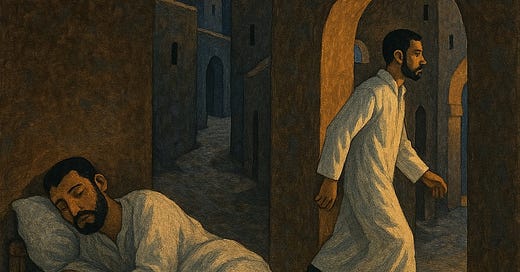When dreams are really real
I don't want to talk about your dream unless you tell me your feelings around it - I mean, especially, your first feelings on leaving the dream. Feelings inside the dream obviously matter, but first feelings afterwards are our best immediate guide to where to go with a dream. Is it urgent? Is it personal? Does it feel more literal or more symbolic, or like an experience in another reality? Is it negative or positive?
In dream sharing, I find I sometimes have to coax tellers to express their feelings. This becomes quite an education. To say that your feelings are "neutral" is a valid response, by the way. Often I describe my own feelings about a dream experience as "just-so". By which I mean the experience feels "really real”, as the Mardu, an Aboriginal people, say. Been there, done that. This saves wasting time on arid analysis, and keeps the vital energy of the dream alive. You acknowledge, right off the bat, that your dream was not just a text: it was real experience in a real world beyond the obvious one.
Now you are ready to do something more interesting with a dream than interpretation. If you know that your dream is a real experience, it’s not much of a stretch to recognize that its meaning is inside the dream itself. The trick is to get back inside and recover more of what was going on. Dream reentry - the practice of revisiting a dream to gather more information, dialogue with characters, and sometimes to dream the dream onward for healing and resolution - is one of the core techniques of Active Dreaming.
Another is what Jung called amplifcation, which means tracking the details of your dream in all available sources, including mythology, archaeology and lingusitics. In the age of Google and AI, it’s amazing how much can turn up at the click of a mouse. Check that you understand the meaning of sipapu (I refer to one of my dreams from last night) and its role in the Pueblo cosmogony; see if you can identify the place where you met those indigenous people. Does the French intello you found arrogant have an identity in this world?
The sense that a dream was really real is stronger when you return travel-worn. I frequently come back jet-lagged – happy and satisfied, more often than not, with exciting research assignments, while feeling I just got off a ten-hour flight from a very different time zone. I may notice specific bodily symptoms that can only be accounted for by my dream activity. This is not surprising because, while Western psychology shies away from the subject, we typically don’t travel in dreams as disembodied thought forms, but in a subtle vehicle that may be called the astral body or, quite simply, the dream body. What happens to it may redound upon the physical body with varying effects.
Illustration RM + AI
A Sufi perspective: Dreaming as the Exit of the Soul
Whether or not the dreamer notices, dreams are often experiences beyond the body.
"Dreaming is a journey away from oneself to another region, a region Si Llasan does not name as an abstract entity but as an 'exit' – the verb he keeps using is khraj: an exit to an Outside. The exiting is that of the soul, the rūḥ, a person’s noncorporeal spirit, which leaves the body during the state of absence that is sleep. It leaves the body, due to an affliction of longing, and wanders outside."
- Stefania Pandolfo, writing about what she learned over five years of listening to Si Llasan, a Quranic scholar and dream interpreter in a Moroccan village in her beautiful, brain-teasing book Impasse of the Angels: Scenes from a Moroccan Space of Memory.




